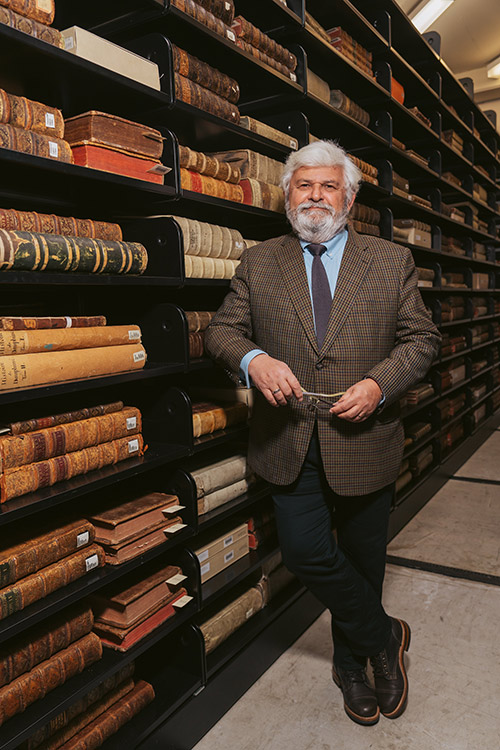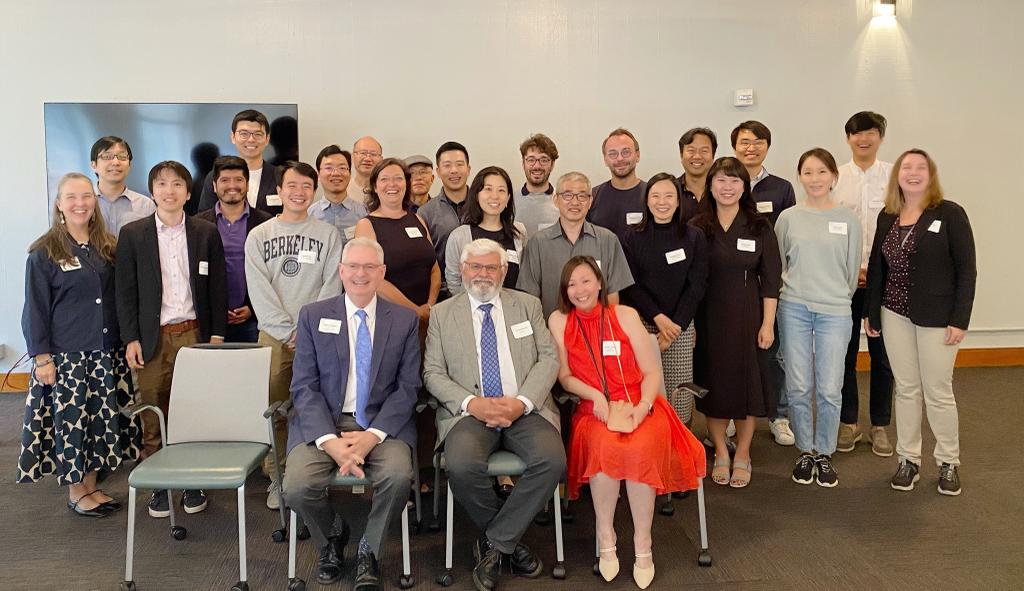By Gwyneth K. Shaw

During his master’s studies at Tashkent State University of Law and then as an independent doctoral researcher, Botirjon Kosimov explored judicial independence in his home country of Uzbekistan, then compared it to how United States courts ensure the independence of jurists.
After he became an acting associate professor at the same school, Kosimov wanted to explore the U.S. angle even further, and was intrigued by the work of the Berkeley Judicial Institute (BJI), one of Berkeley Law’s roughly two dozen research centers. So he applied to the school’s Visiting Scholars Program (VSP), and spent three months in fall 2022 in residence — sponsored by Jeremy Fogel, BJI’s founding executive director and a former federal judge.
The experience was invaluable, Kosimov says, for a wide variety of reasons, from bolstering his research to making him a better classroom teacher.
“I am very grateful for this program, which gave me many opportunities for doing research and personal development,” he says. “The campus structure allowed me to explore more things than I expected, and the Berkeley Law Library and online resources made my research effective.”
Fogel offered research and practical support and arranged for Kosimov to visit California courts to see the proceedings in person. Kosimov also audited Constitutional Law classes taught by Dean Erwin Chemerinsky and Professor Amanda Tyler, which made a big impression.
“Observing teaching strategies of these professors allowed me not only to learn new things, but also to reflect on how we teach law in my country, which is very important for the continuous development of a law professor,” he says. “I am glad that I also had a moment to talk to these professors and share our thoughts related to my research and legal education.
“Moreover, I had an opportunity to meet new people who were mainly researchers, scholars, and professionals from other nationalities, attend different social events with them, and talk about our research and share our ideas.”
Building bridges
Kosimov’s experience is exactly what the program is about, says Professor Laurent Mayali, its faculty chair. Mayali himself first came to Berkeley Law as a visiting scholar in 1980; he joined the faculty of UC Berkeley’s Department of Rhetoric in 1985 before permanently joining the law school in 1988.
Interested scholars must apply to the program with a research project already in mind and should have received a doctorate degree at least five years earlier. They must have their own funding and are expected to be in residence on the Berkeley campus during their term.
Applications are open for the fall 2024 term until March 1, 2024.
The program helps broaden the school’s international connections as well as the influence of its faculty on the legal and scholarly communities around the world, Mayali says. It complements Berkeley Law’s Master of Laws (LL.M.) and Doctor of Juridical Science (J.S.D.) programs, and it’s not unusual for former LL.M. students to later apply to be visiting scholars and vice versa, he adds.
The VSP furthers the intellectual and cultural diversity of Berkeley Law, he says, and allows faculty to develop joint research projects with scholars abroad and creates opportunities for them to offer expert advice on the law to foreign governments and policy advocates.

In turn, the program offers scholars access to research, library, and internet resources that are often vastly superior to what their home institutions offer, Mayali says. Senior faculty members, practicing lawyers, judges, and Ph.D. students can access not just U.S. sources and materials, but often materials from their home countries, through the Berkeley Law Library and the school’s Robbins Collection and Research Center, which holds over 300 rare manuscripts that date as far back as the 12th century among its 300,000-item inventory.
They can also audit courses, with the permission of the instructor, in areas relevant to their research or to gain new perspectives.
“The intellectual diversity of the program is amazing. It reflects the broad significance of law and legal rules in many countries around the world,” Mayali says. “The visiting scholars contribute to the diversity of the academic and scholarly environment at Berkeley Law, keeping in line with the school’s strong tradition of commitment to international exchanges of ideas.”
The ‘Berkeley Club’ expands
The VSP has a particularly strong connection with South Korean scholars, dating all the way back to a 1970s-era joint program. That first group of visitors — mostly judges and prosecutors — decided to get together for dinner once a year and dubbed themselves the “Berkeley Club.”
Over the years, more and more visiting scholars came from South Korea’s judiciary, legal practice, and academia, and the club’s membership grew steadily.
“It became and remains today a very influential group in Korean society and politics, and has more than 400 members,” Mayali says.
Their ranks include former prime ministers and members of the government, justices of the Korean Supreme Court and Constitutional Court, chief judges of the Courts of Appeal, top prosecutors, prominent lawyers from the top Korean law firms, and many deans and professors from top law schools. The ties are so strong that Mayali and Professor John Yoo established the Korea Law Center at Berkeley Law in 2014.
In May 2023, Mayali traveled to Korea to discuss a Memorandum of Understanding with the Korean Supreme Court to send more judges to the VSP. Chemerinsky recently signed the final agreement.
Half of this year’s visiting scholars are from South Korea.
“I received tremendous support from Berkeley Law by allowing me to attend different events and audit law classes,” Wontae Jang, a judge advocate in the Republic of Korea Air Force, wrote in a testimonial for the program. He’s visiting Berkeley Law this year, sponsored by Yoo.
“Berkeley Law gave its best support for the research of visiting scholars,” he wrote. “I am glad I have an opportunity to join the program and hope to revisit it.”
Kosimov feels similarly. During his time at Berkeley Law, he wrote a paper, “Ensuring Judicial Independence in the United States and Lessons for Uzbekistan,” and presented it to the law school community. The paper analyzes how judicial independence is protected in the U.S. and what lessons Uzbekistan can learn from these rules, covering a wide range of issues related to an independent judiciary, including its history and challenges and its relationship to judicial accountability.
After returning to Uzbekistan, Kosimov gave a presentation about his Berkeley Law experience and his research at his home institution, and published a book and an article incorporating the work he did as a visiting scholar. He also integrated what he learned into his teaching.
“I am very proud that I was part of the Berkeley Law community, which supports the research of visiting scholars at its best and where researchers gain life-changing experience,” he says.